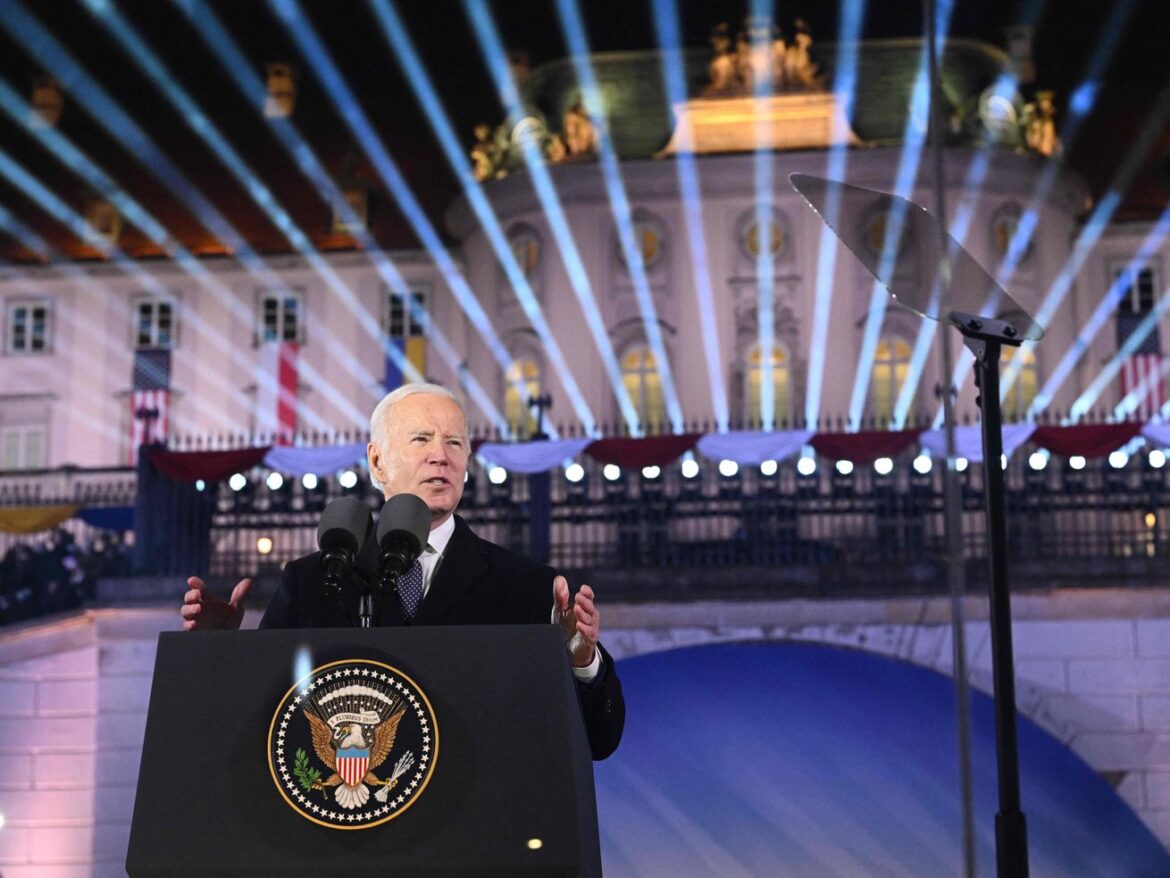Biden in Warsaw, Putin in Moscow.
After a surprise visit to Kyiv in the midst of the ongoing war, President Joe Biden delivered a rallying speech on US support for Ukraine.
Speaking to a crowd of thousands in Warsaw, Poland, on Tuesday, Biden framed the war as a battle between democracy and autocracy, as he has consistently done for the past year. He expanded upon the rhetoric of his recent State of the Union address, saying that since Russia invaded Ukraine nearly one year ago, “the whole world faced a test for the ages,” and emphasized the resolve of the US and NATO to continue to bolster Ukraine’s defense.
Hours earlier in Moscow, Russian President Vladimir Putin delivered his own address. He justified Russia’s invasion of Ukraine with some revisionist history, emphasized the massive quantity of weapons the West has provided Ukraine, and announced the withdrawal from an important arms control agreement with the United States. It’s a chilling indication that the stakes of this war are not just Ukraine’s future but the world’s future. The threat of a nuclear conflict always lingers in the background.
“The worst-case scenario is escalation,” Hans Kundnani of the British think tank Chatham House told me. “It seems to me the best-case scenario here is a forever war, unless the Biden administration does push toward negotiations.”
But neither Ukraine nor Russia have expressed any openness to negotiations at this stage.
Tuesday’s split-screen speeches are a reminder that a year into the Russian invasion of Ukraine, both Biden and Putin are doubling down. “We have every confidence that you’re going to continue to prevail,” Biden told Ukrainian President Volodymyr Zelenskyy a day earlier in Ukraine. But that confidence in public may be obscuring anxieties that foreign policy leaders are expressing in private as the war continues into its second year, as major democracies like India decline to take a firm side, and as the risks of the war expanding beyond Ukraine’s borders are heightened.
Dueling speeches versus closed-door conversations
Biden has long made US support for Ukraine all about the values. “President Putin is confronted with something today that he didn’t think was possible a year ago. The democracies [of] the world have grown stronger, not weaker, but the autocrats of the world have gotten weaker, not stronger,” Biden said in Warsaw.
That story has rallied the Western allies in the North Atlantic Treaty Organization remarkably well. NATO and the European Union have imposed sanctions on Russia and offered tens of billions in military and economic aid to Ukraine. But countries elsewhere have taken more nuanced stances, with, for example, Israel, Latin American countries, and others like India declining to support Ukraine.
“Actually, what this war has done is divide the world’s democracies,” Kundnani told me. “A lot of the world’s democracies outside of the West — in particular, the world’s largest democracy, India — just doesn’t see it that way.” And part of the reason that India has been reluctant to back Ukraine, whether by joining the Western-led sanctions against Russia or by providing Ukraine with assistance, is India’s broader strategic calculation in countering China.
The war in Ukraine has taken US attention away from China, a rising power that experts agree poses a long-term security threat. One of the worst possible outcomes of the Ukraine war would be America’s two primary rivals, Russia and China, joining sides. Secretary of State Antony Blinken warned of the possibility that China had provided security assistance to Russia.
For his part, Putin spoke to the General Assembly about what he says is the threat of US militarism in the world. He blamed Ukraine for the war, despite having ordered the invasion himself. And his extended remarks included a rousing call for Russian business to rescue the battered economy.
“While Putin’s view of reality might seem very distant, that makes it all the more important to track his perverse logic,” says Jade McGlynn, a researcher at King’s College London. “After all, it is a view shared by many Russians and, equally importantly, it dictates what is possible in our reality, too.”
The most significant aspect of Putin’s speech was the announcement that Putin would be suspending its participation in the New START treaty between the US and Russia, the last remaining agreement between the two countries limiting their nuclear and unconventional weapons. This escalatory move may be Putin’s response to having been stymied on the battlefield in the face of a revived NATO. In his pursuit of some leverage, he seems willing to take ever more dangerous risks.
At the annual Munich Security Conference this weekend, the world’s national security influencers’ attention was on the war in Ukraine — particularly, on how to get Ukraine more weapons. That, at times, felt like an echo chamber. While the US has already provided or promised $29.8 billion of weapons to Ukraine, a number of prominent US foreign policy experts, like former George W. Bush official Eliot Cohen, claim, “the West continues to be dilatory in arming Ukraine.” Others continue to push for “What’s next.” Biden on Monday announced an additional $500 million in military aid to Ukraine, days after Vice President Kamala Harris delivered a speech in Munich that described Russia’s actions in Ukraine as crimes against humanity.
But in private, people reportedly expressed worry about the trajectory of the conflict.
“The corridor talk was considerably more anxious,” wrote Richard Fontaine of the Center for a New American Security think tank. “[W]orries about a prolonged war abounded. Western support cannot remain at current levels indefinitely. Political support may ebb, stockpiles are dwindling, and populations could grow less generous over time. In a long war of attrition, Moscow might have the upper hand.”
Even US officials have apparently been conveying this message to Ukraine. “We will continue to try to impress upon them that we can’t do anything and everything forever,” an unnamed Biden administration official told the Washington Post recently. It reflects the discussion that needs to be had but isn’t happening publicly. But one can be sure that if it appeared in the Post, it’s something that Biden conveyed in his private audience with Zelenskyy in Kyiv.
On Tuesday, though, you wouldn’t have known either Russia or the West is thinking about an end to the conflict any time soon. As McGlynn put it, “The gulf in how this war is seen by both sides makes peace almost impossible.”



